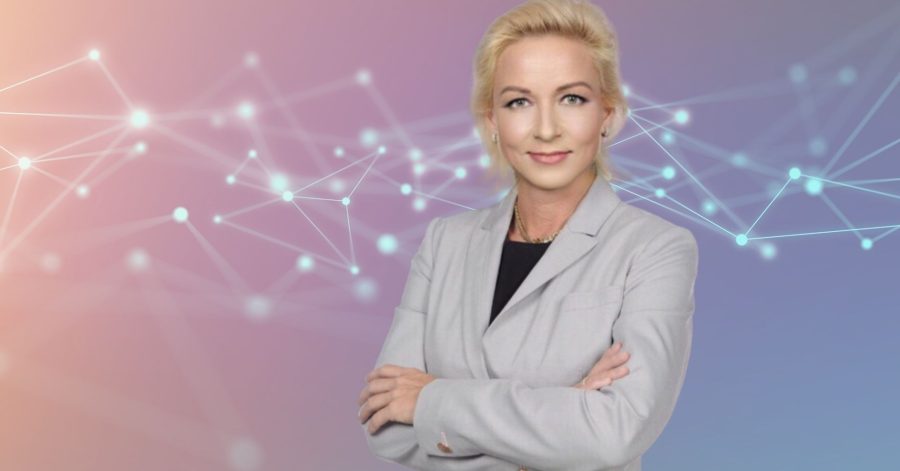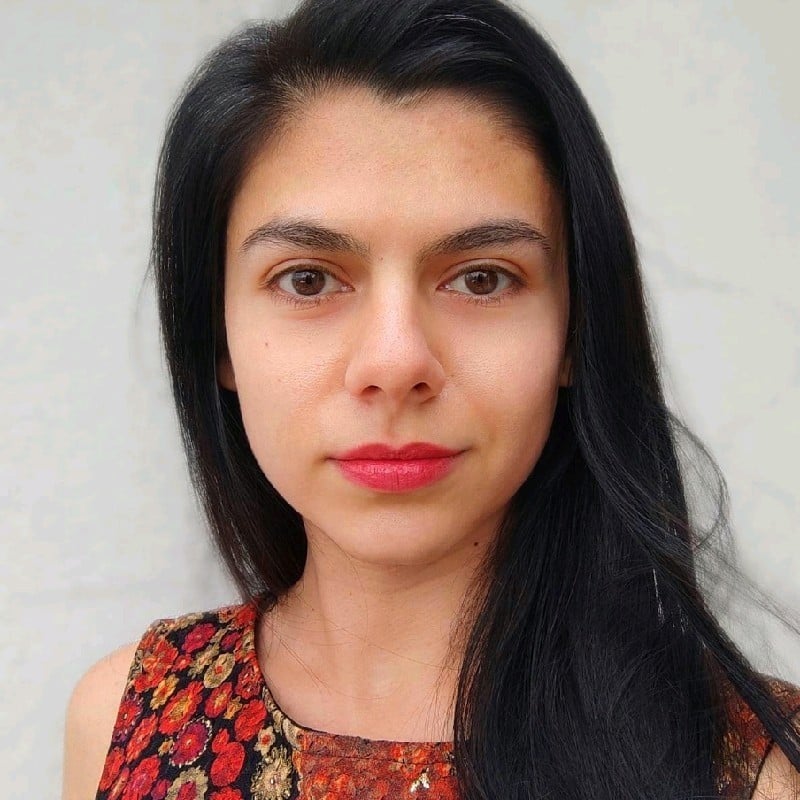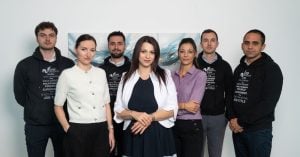Can blockchain be the panacea for the cybersecurity and data management challenges that we face in the unfolding smart city life?
This is one of the key questions that DevTalks Romania will aim to answer at its annual conference that will take place next month, from the 8th to the 10th of June. This year the focus of the forum will be on AI & Innovation and in the spotlight will be the discussion around the different applications of blockchain technology, web 3.0, the metaverse, and the omniverse (Ed.note a digital platform that connects different metaverses in a shared virtual space). You can learn more about the conference here.
The Recursive spoke to one of the leading speakers, Dr. Ingrid Vasiliu-Feltes, CEO of Softhread, a deep-tech company that develops blockchain and AI-based solutions for companies, to learn her perspective on what the future of blockchain and web 3.0 technology has in store for us.
Dr. Ingrid Vasiliu-Feltes wears multiple hats at the intersection of different fields, such as health, science, technology, digital ethics, entrepreneurship, and investing. Besides being the CEO of Softhread, she serves as the CIO of the Government Blockchain Association. Dr. Ingrid Vasiliu-Feltes is an advisor for the EU Blockchain Observatory and works as a volunteer for many international organizations with a focus on digital advocacy, sustainability, application of blockchain technology, and AI. She works with different UN organizations that provide entrepreneurs access to funding opportunities. Dr. Ingrid Vasiliu-Feltes is an ambassador for the inclusion of more women in AI and works on the promotion of digital health and awareness.
The Recursive: Why is it important to talk about cybersecurity and invest time and resources in it, especially in the new tech era that we are entering?
Dr. Ingrid Vasiliu-Feltes: We are witnessing an unprecedented increase in large-scale adoption of emerging technologies that are facilitating the transition to the 5th industrial revolution. However, they also trigger an increase in cyberattacks and expose cyber vulnerabilities. The average cost per data breach in 2021 has been reported at $6.5M and the overall cybersecurity burden on the global economy continues to skyrocket. Investments in cybersecurity have also increased steadily and 2021 has been a record year as reflected by these statistics: $29.5 billion in VC investments; 1,000 cybersecurity deals, out of which 84 cyber deals were greater than $100M; an increase of up to 138% in total financing value from CY 2020, and an increase in the number of startups achieving $1 billion-plus valuations, from 6 to 30.
What is the role of blockchain technology in cybersecurity? What problems does it solve that could not be resolved before?
Blockchain technology plays a key role in cyber-defense and cyber-resilience due to a few key features: cryptographic keys, a decentralized peer-to-peer network, and a digital ledger. Distributed data-sharing over peer-to-peer (P2P) networks reduces single points of failure, consensus-driven trust reduces the need for intermediary parties, immutable transactions on the digital ledger ensure trust and optimal audibility, data security is driven by hashing and smart contracts promote touchless interactions across process chains.

How can blockchain technology help us build more sustainable and environment-friendly smart cities?
We are currently witnessing what is called by some international experts “The Smart City Revolution”. The Covid-19 induced global crisis has only accentuated preexistent economic and social challenges. These unprecedented times call for innovative solutions and a revised approach to manage this volatile post-pandemic global business environment and for us to adapt to major emerging technology megatrends. Blockchain technology is uniquely suited to facilitate alignment with the United Nations’ Sustainable Development Goals (UN SDG) 2030 agenda and offers a comprehensive solution for Environmental, Social, and Governance (ESG) metrics tracking. This way smart city deployments will already have privacy, and security embedded by design and key stakeholders will be able to adequately track short and long-term impact on the environment, society, and global governance, in addition to the financial return on their investment.
Could you give us your opinion on Web 3.0 and the importance of privacy and ownership in the new way we will consume, create and own information in the new era of the Internet?
Experts who perhaps believed AI, Blockchain, or Quantum would be the dominant force of the next Industrial Revolution are now likely wondering if Web 3.0 will play that key role. From a digital ethicist’s perspective, one can expect significant concerns about how these will impact moral values and the ability to uphold ethical principles. Experts were already warning about the profound and transformative socio-cultural impact of quantum, AI, blockchain, 6G, brain-computer interfaces, and other emerging technologies, as well as the need to prevent ethical violations. Now their concerns will be heightened and key stakeholders are faced with an even more complex web 3.0-fueled digital ethics conundrum.
While it is designed to uphold consumer privacy and rights, it also opens up the possibility of increased cyber attacks due to the multi-sensory consumer engagement we will face via the metaverse and omniverse. While some might argue that the intent is clearly to promote innovation and societal progress, they certainly increase the potential for malicious use.
Web 3.0 would aim to uphold the principles of fidelity, integrity, and autonomy, however, we can certainly extrapolate from past deployments of other emerging technologies that it is difficult to enforce during large-scale adoption. While regulatory and legal experts are still trying to bridge the gap in frameworks that can address emerging technologies such as blockchain, AI, or next-generation computing, they must now face an even larger challenge as web 3.0, Metaverse, and Omniverse are trespassing multiple industry boundaries while posing unique, novel ethical challenges.
What is the importance of having an ethical approach to cybersecurity?
It is a moral imperative for business leaders to build a digital culture of ethics in order to preserve or restore trust in emerging technology deployments. This can be achieved by designing and deploying proactive digital ethics programs, as well as a robust quality assurance and quality improvement framework. Governments, academia, the private sector, and not-for-profit organizations would all have to collaborate to be successful.
In addition to legal and regulatory updates, developing international standards, implementing key ethical performance indicators, as well as embracing societal expectations of diversity and inclusion will be paramount. First, we would have to establish the ethical design philosophy and desired outcomes for a society fully immersed in the Meta and Omniverse. Second, we would aim to create a robust ethics architecture that would ensure adequate data governance and address identity management, privacy, security, ownership challenges, etc. The third would be the development of a customized ethical framework for various industries or domains. This framework would include the impact on society, the environment, long-term sustainability, education, and emphasis on ESGs.
It would be our hope that forward-looking companies leading the charge in deploying the web 3.0 and smart cities infrastructures would be ethically and purpose-driven, with a vision and mission that aim to deliver “ethical, transparent” services or even to facilitate the attainment of UN SDGs. – Dr. Ingrid Vasiliu-Feltes
What will be the most critical data management issues that we will face in this hyper globalized environment?
Data integrity, data provenance, and optimized data sharing will be crucial in this digital era. Experts predict that 70% of the globe’s GDP will have undergone digitization by the end of 2022, and by 2025 463 exabytes of data will be generated daily, while 200+ zettabytes of data will be in cloud storage globally. By leveraging the combined features of technologies such as blockchain, artificial intelligence, advanced computing, and novel encryption techniques we can significantly optimize data management within IoT networks.
How will we build our digital identities on Web 3.0?
Digital identity is crucial for safe and confidential web 3.0, metaverse, and omniverse interactions. Digital identity determines who you are, what you can access and do, and how you’re represented across these new digital ecosystems. The creation of digital cyber-twins is one of the opportunities for further development and research that could change the paradigm and significantly increase our long-term success in creating a safe, confidential web 3.0-enabled ecosystem for future generations.
How can digital twin technology be applied in medicine and what new doors do they open for the health industry?
Healthcare is a wonderful example where digital twins (Ed.note a virtual representation of a real-life object or process) could potentially solve a lot of major challenges we are facing in healthcare globally. From a healthcare delivery perspective, they could enhance the quality and safety of healthcare, improve clinical decision support systems, accelerate the transition from research to clinical deployment of various medications and expedite the approval of various new precision medicine solutions.
For the medical device industry, it could also mean a much shorter approval cycle and a higher safety profile. In medical education, they could contribute to a more interactive teaching methodology and more effective safety training. For various disciplines like surgery, oncology, or precision medicine having these digital twins could be revolutionary and disruptive. Last but not least, digital twins would also allow us to develop a hyperconnected global healthcare network and derive important insights that would drive research and the development of innovative diagnostic or treatment methodologies.








